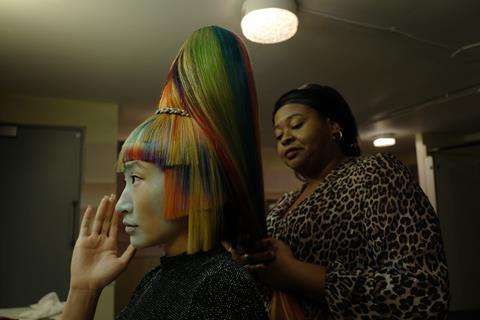This experimental one-take drama is a darkly comic meta-whodunnit set at a hairdressing competition

Dir: Thomas Hardiman. UK. 2022. 101 mins.
Contemporary British cinema isn’t normally where you’d go in search of the outre and formally playful, so Medusa Deluxe sticks out a mile — just like the towering coiffure confections seen in this darkly comic meta-whodunnit set at a hairdressing competition. A luridly-dressed but economically mounted experimental creation staged as a one-take ensemble drama, this brashly confident debut should bring plentiful regard for British writer-director Thomas Hardiman, one of Screen’s 2021 Stars of Tomorrow. It’s moot whether this MUBI pickup will reach beyond hip cinephile circles after its Locarno debut, given its wilfully esoteric approach, although it should score at festivals and outlets in the LGBTQ+ and art-house/artists’-film galaxy.
Hardiman has elaborated one of the most extravagant one-offs in recent cinema, with echoes of Almodovar and Greenaway, and a distinctly British flavour including knowing dashes of TV-soap backchat.
Taking place across several floors of a labyrinthine studio building, the film begins after a stylist named Mosca has been found, dead and scalped, following a competition for professional hairdressers. Ducking up and down corridors and staircases, in and out of dressing rooms, Robbie Ryan’s camera weaves between conversations as we meet the various witnesses, suspects and traumatised onlookers.
They include stylist Cleve (a barnstorming Clare Perkins), a ferocious motormouth with anger issues, and her more laidback rival, the aptly-named Divine (Kayla Meikle), who combines her passion for coiffure with a love of God. Arriving later is Kendra (Harriet Webb), something of a den mother to the whole scene, while the raspy-voiced, silver-quiffed Darrell D’Silva plays Rene, flustered ringmaster of the event. Rene eventually leads the action out of the building as he goes to meet the deceased’s lover Angel (Luke Pasqualino), who arrives with his baby in tow — a commendably patient mite (played by Logan and James Porter) who gets handed around the cast for care and cuddles.
There’s also a security guard (Heider Ali), unnerving everyone with his looming presence. But long before all the players have been introduced, it’s easy to feel lost: the film begins with a ferocious burst of backstory exposition about characters’ love lives and transgressions. Right from the start, you fear that there’s no narrative comb that could possibly untangle this dense weave of intrigue.
Indeed, in that opening scene (preceded by a dreamlike CGI prelude), viewers already have the gist of what the film will be — brilliantly performed and shot, but somewhat theatrical and a little alienating. You wonder what Hardiman can bring that’s new to the already overworked micro-genre of the one-take exercise, recently so dazzlingly executed in British restaurant drama Boiling Point.
Yet, once Medusa Deluxe settles into its groove, its febrile tone, the elegant intensity of the acting and the quickfire grace of its scabrous wit start to work their effect. Like the characters, the camera too gets lost in and around the building — long Steadicam takes slyly edited by Fouad Gaber to suggest one seamless shot — while the design and the camerawork cleverly combine so that the colours of the decor, including vibrant citrus shades, magically rhyme with those of the characters’ clothes and hair — notably when model Inez (Kae Alexander) strides through the corridors wearing a cascading turret of rainbow strands.
The mystery of who did what to whom takes second place to the byzantine play of words, camera moves and psychological fencing. The script focuses on the talk around the investigation, rather than the investigation itself, police activity merely glimpsed in the background — a sign of the film’s audacity, but one reason why some viewers might hesitate to invest themselves. But a consistent thread running through is the interplay of professional ambition, fetishistic follicular adoration and erotic desire.
Hardiman, drawing wittily on his own love of coiffure, has elaborated one of the most extravagant one-offs in recent cinema, with echoes of Almodovar and Greenaway, and a distinctly British flavour including knowing dashes of TV-soap backchat. The hair design by Eugene Souleiman is a wonder to behold, not least in Cleve’s showstopper, the baroque ‘Georgian Fontange’ (it’s an actual thing, rooted in the 17th century), topped with a glow-in-the-dark galleon. And musician Koreless heightens the tension with a sparse percussion-and-electronics score that’s all tremors and rhythmic crackles.
Whether Medusa Deluxe quite convinces us that it needed to be a one-shot exercise, it’s carried off niftily — the electric performances, from a super-alert, bristling cast, giving a feel of live event to the action, framed in Academy ratio. And Hardiman has more surprises in store: a couple of daring jumps in time and a climax that explodes the claustrophobia with a spectacular bit of razzle-dazzle, plus a cheekily rousing coda. It makes for a flamboyant sign-off to a picture that’s about as far you can get from the short-back-and-sides tradition of British realism.
Production companies: EMU Films, Time Based Arts
International sales: New Europe Film Sales, festivals@neweuropefilmsales.com
Producers: Michael Elliott, Louise Palmkvist Hansen, Lee Groombridge
Screenplay: Thomas Hardiman
Cinematography: Robbie Ryan
Production design: Gary Williamson
Editing: Fouad Gaber
Music: Koreless
Main cast: Clare Perkins, Anita-Joy Uwajeh, Kae Alexander, Harriet Webb







![The Brightest SunScreen[Courtesy HKIFF]](https://d1nslcd7m2225b.cloudfront.net/Pictures/274x183/3/5/0/1448350_thebrightestsunscreencourtesyhkiff_312678.jpg)















![The Brightest SunScreen[Courtesy HKIFF]](https://d1nslcd7m2225b.cloudfront.net/Pictures/100x67/3/5/0/1448350_thebrightestsunscreencourtesyhkiff_312678.jpg)










